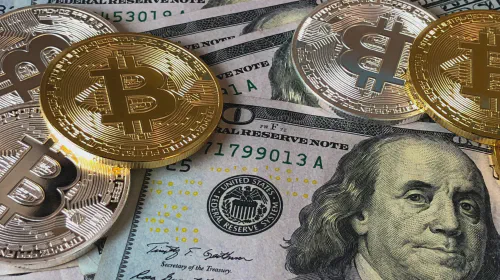Essential Tips to Secure Your Cryptocurrency Wallet
Salomon Kisters
Nov 8, 2023This post may contain affiliate links. If you use these links to buy something we may earn a commission. Thanks!
Cryptocurrencies, or crypto as they are truly termed, are digital currencies that are used for making digital payments, digital investments, and digital transfers. These currencies do not require a bank or any other financial company to verify their investments or purchase transactions.
Bitcoin (launched in 2009) is the first and the largest cryptocurrency used all around the globe for crypto trading. Ethereum, Litecoin, Ripple, etc., are a few more names of cryptocurrencies.
Digital payments via cryptocurrencies are done by using cryptographic algorithms and are stored as digital entries in a blockchain. They use encryption for transaction verification, wherein the latest coding techniques are implemented for storing and exchanging cryptocurrencies.
Cryptocurrencies are stored in a cryptocurrency wallet, and their transactions (fund transfers) are recorded in a public ledger.
- What is a Cryptocurrency Wallet?
A cryptocurrency wallet is a device/program/application that stores and secures the private key that is used for exchanging cryptocurrency transactions. Apart from storing the keys, this crypto wallet permits the encryption of information.
The three main types of crypto wallets are Hardware Wallets, Software Wallets, and Paper Wallets.
- Crypto Trading & Crypto Hacks:
The crypto industry is becoming extremely popular and, hence, has enticed many hackers to carry out huge hacking attacks to gain these currencies. Cryptocurrency transactions that are recorded in a blockchain (decentralized ledger) are always threatened by hackers who target vulnerable crypto wallets.
DeFi (decentralized finance) protocols turned out to be the biggest victims (82.1%) of these hacks and are still increasing to date. Hackers use varied tactics for stealing cryptocurrencies, ranging from using fake cryptocurrencies, guessing/recovering passwords, phishing attempts, ransomware attacks, stealing the private key, knowing the lock code of your phone in a secret way, blocking transactions by using nodes, hacking on exchange platforms, vulnerability in transactions, and many more.
- Importance:
The above graph, as well as the tricks carried out by hackers, are enough to signify the importance of securing the cryptocurrency wallet. Normal wallets hold cash, whereas crypto wallets hold the private key (not crypto). Your cryptocurrencies can be accessed with this key, and the ownership of this key will permit you to carry out crypto trading and other digital transactions.
If your private key is lost, you lose access to your digital money, and hence securing your cryptocurrency wallet is vital.
We are not here to scare you but to highlight your knowledge about how profitable crypto trading can be by securing your cryptocurrency wallet and implementing secured crypto trading solutions.
So, without further ado, let us get rolling.
- Top 10 Tips to Secure Your Cryptocurrency Wallet:
- Diversify your Wallet & Use Cold Storages:
Storing your cryptocurrencies by using diverse wallets is a wonderful idea to distribute your digital money.
This helps minimize the risk of losing all your cryptocurrencies since they are distributed in varied wallets, i.e. The risk is minimized when a single wallet is exploited.
Secondly, using cold storage like hardware wallets (offline storage method) strengthens the wallet security since it is not linked to the web.
This helps in keeping your private key secured from cyber threats.
Example: Ledger USB Wallet secures the private key using smart cards.
Tip: Never share your private key with anyone.
- Create Wallet Backups:
Creating Bitcoin wallet backups will help secure your assets against human errors or device crashes. Back up your cold storage as well as your crypto wallet that is used for trading digital currencies to recover the same in case of contingencies.
Tips:
- Back up your whole wallet, including your private key.
- Encrypt your backup to prevent malicious actors from invading it.
- Use varied wallets and multiple storage locations for backups and easy recoveries.
- Backup regularly.
- Use a Reputable Buy/Sell Exchange:
Not all exchanges are the same, i.e., some exchange transactions are more bolted than others. Use exchanges that implement MFA (multi-factor authentication), strong passwords, HSMs (hardware security modules), SSL certificates, etc., for strong security.
Crypto Crime accounted for $20.6 billion worth of blockchain transactions - Research by Chainalysis
If your exchanges are not secured, they become vulnerable, and crypto hackers can rule blockchain by controlling more than 51% of the hash rate.
Ensure that your centralized crypto exchange (Coinbase, Bitfinex, etc.) takes responsibility in case of cyber-attacks, has safety solutions in place, and offers an account freeze option if required to minimize the damages.
- Secure your Cryptocurrency Wallet With SSL:
Your cryptocurrency wallet must have HTTPS security to win the trust of customers as well as to secure the data shared by online visitors. These indicators will be in your wallet URL if you buy SSL Certificate and install it on your wallet.
The absence of an SSL certificate on your website will make your site vulnerable, thus permitting hackers to gain control over your site, steal your login credentials, and empty your crypto wallet.
Phishing websites are quite identical to legit sites, and hence, it is advisable to verify the site’s SSL certificate to know its authenticity. If you see a padlock and https, it is a sign that the site has an SSL certificate installed, which secures the site and its data with encryption algorithms.
- Double-check the Destination Address:
Recheck the destination address before initiating the cryptocurrency transaction and sending your crypto.
Hackers can initiate malware to alter the crypto address, thus causing digital transfers to the wrong recipient. To prevent such irreversible disasters, verify the address twice before initiating an exchange.
Another option to ensure precision is to initiate a test transaction by transferring a small amount to the address. If the same is successful, transfer your entire crypto to that address.
Note: Crypto sent to the wrong address is gone forever unless the wrong recipient decides to send it back to you.
- Keep your Holdings Private:
Ensuring the privacy of your cryptocurrency holdings is vital for its security. Refrain from discussing your digital assets in front of the public.
This precaution goes a long way in minimizing the risk of targeted crypto attacks, thus keeping your crypto holdings secure.
- Prioritize Service Safety:
When third parties are involved in managing your cryptocurrencies, place service safety options as the foremost criteria.
Since you are handing your private key to a third party, ensure that your crypto service provider implements strong security solutions like encryption security, regular software updates, and other security protocols for the security of your crypto wallet.
Note: If the third party gets hacked, your digital funds are at risk.
- Change your Password Regularly:
Preventing password breaches is possible only if the password is changed frequently at regular intervals.
Refrain from using the same password again and keep on changing the same regularly for better crypto wallet security.
Tip : Save your passwords in LastPass (password manager) to keep them secure from prying eyes.
- Beware of Phishing Scams:
Phishing scams are a popular threat in the digital world. Smart hackers use sophisticated ways to lure users into giving their crypto wallet details and passwords.
Be cautious while opening emails, clicking links, and other applications related to your crypto accounts.
Check the website’s URL for a padlock (presence of SSL) and HTTPS to ensure site authenticity.
Tip : Never reveal your private keys or cryptocurrency passwords to anyone, since reliable crypto exchange platforms never ask for these details.
- Update your Software Regularly:
Keep your software updated, and always use the latest version of your Bitcoin software or any other cryptocurrency software to eliminate all security vulnerabilities. This, in turn, will help prevent hackers and phishers from accessing your digital money.
Using updated software will seal all the security lapses and strengthen the security of your cryptocurrency wallet.
Few More Security Tips:
Refrain from public Wi-Fi and always opt for a VPN (Virtual Private Network).
Check the URL twice before opening websites and emails.
Always update your software manually by turning off the automatic updates option. This will prevent malicious inputs (if present in the released versions) from reaching your crypto wallets.
Refrain from doing crypto trading from your personal/work devices. Create a separate email for your crypto wallet and use a separate laptop/smartphone for crypto trading.
Use 2FA (two-factor authentication) or MFA.
Refrain from sharing your successful cryptocurrency stories on social media platforms.
Stay updated with the latest crypto-threats and keep a backup plan in place to prevent them.
Final Words:
The cryptocurrency world is enticing for the public as well as the hackers. Ensure the security of your digital money by implementing the above-stated security solutions and secure your cryptocurrency wallet.
This will help you in enhancing the security of your crypto holdings and in dealing with your digital revenues with confidence.
Stay informed with the latest insights in Crypto, Blockchain, and Cyber-Security! Subscribe to our newsletter now to receive exclusive updates, expert analyses, and current developments directly to your inbox. Don't miss the opportunity to expand your knowledge and stay up-to-date.
Love what you're reading? Subscribe for top stories in Crypto, Blockchain, and Cyber-Security. Stay informed with exclusive updates.
Please note that the Content may have been generated with the Help of AI. The editorial content of OriginStamp AG does not constitute a recommendation for investment or purchase advice. In principle, an investment can also lead to a total loss. Therefore, please seek advice before making an investment decision.

Why Can There Only Be 21 Million Bitcoins? Impact of Bitcoin's Fixed Supply
Discover why there can only be 21 million Bitcoins and the impact of Bitcoin's fixed supply on inflation control and scarcity.

Blockchain Technology for Tracking and Tracing in Supply Chain Management
Learn how blockchain technology can revolutionize supply chain management by providing a tamper-proof, accurate, and transparent system for tracking and tracing goods.

7 Crypto Marketplaces Similar to eBay: A Comparison of Blockchain-Based Platforms
Discover 7 blockchain-based marketplaces similar to eBay that use smart contracts and dApps for secure and transparent transactions. See how they compare!
Protect your documents
Your gateway to unforgeable data. Imprint the authenticity of your information with our blockchain timestamp